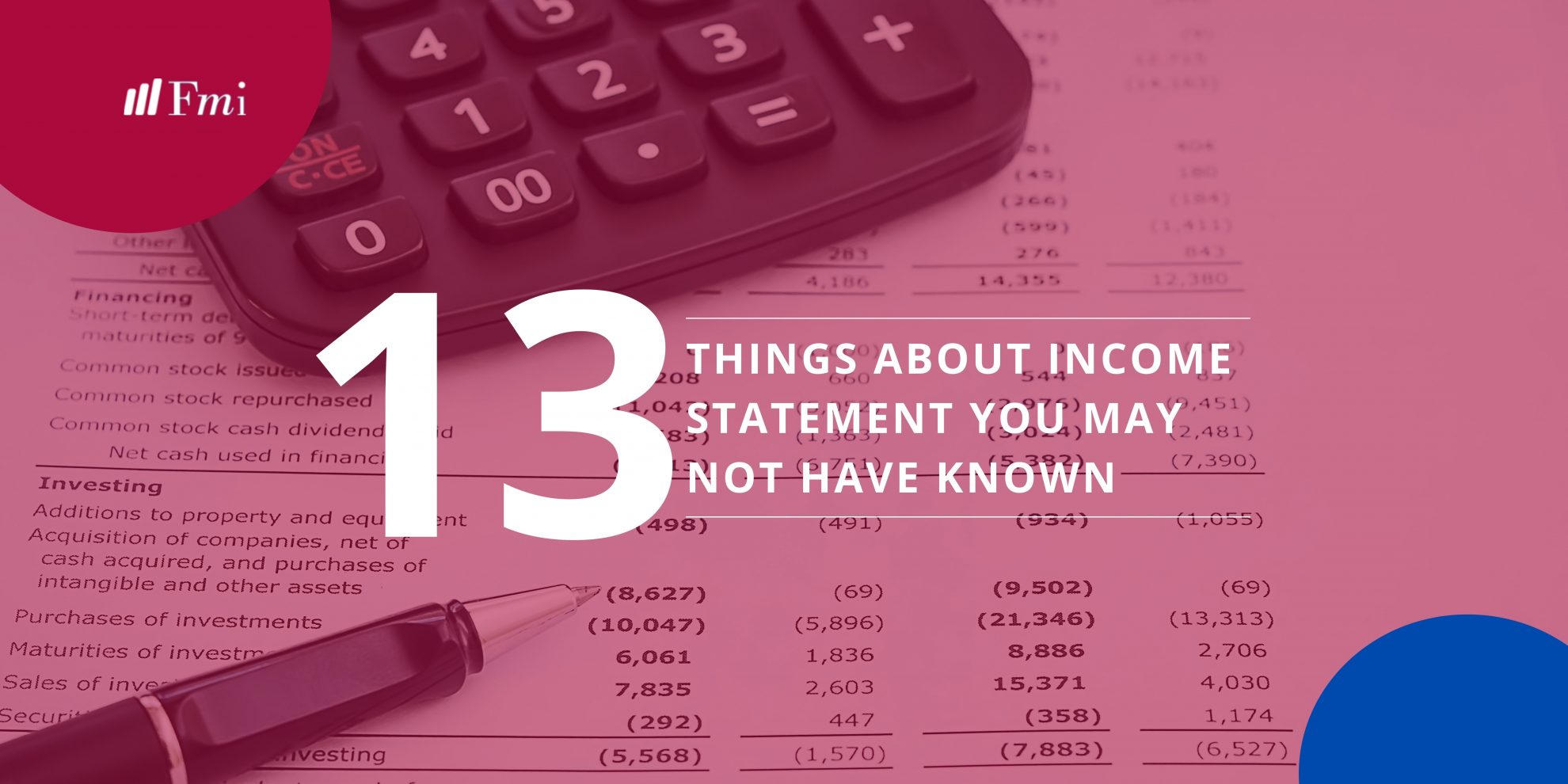You don’t need a background in finance or business or understand what an income statement is. As the name explains, this is a financial tool that records and shows a business’ income. To calculate income, one has to know the revenue and expenses, hence, an income statement clocks in all the revenue and expenses for a set period of time to ultimately calculate a company’s profit or loss.
An income statement’s typical elements include cost of goods sold, sales or revenue, expenses, gross profits, taxes, and earning before taxes.
While this is the income statement in a nutshell, in this article, we discuss this instrument in detail, highlighting 13 lesser known facts about them. These could be useful to you if you are a student looking to understand income statements, or an emerging business. This article can also serve as a primer on income statements if you are about to appear for a job interview that requires you to know financial statements in and out. So, here goes:
1. Income statement is also called the Profit and Loss statement:
Since an income statement tells you whether you’re making a profit or loss, it is also referred to as the Profit and Loss statement.
2. The math driving an income statement is simple:
Income statements are typically based on and calculated with this simple formula:
Net Income = (Revenue + Gains) – (Expenses + Losses).
Revenue is the money coming in from the business’ primary sales; gain is the net money made from other activities, like the sale of long-term assets; expenses are the costs of running the business and losses usually occur when an asset is sold for less than what’s originally shown in a company’s books.
3. Income statements can be Single-Step or Multi-Step:
The above formula is the building block of the single-step income statement, where each section is just a single line. Multi-step statements, on the other hand, divide each section into several categories to include all details. For example, expenses can be operating and non-operating.
4. If someone asks you a business’ bottom line, you look at the income statement:
Bottom line – which is probably something you have heard often during a company’s meetings or around the fiscal year closing or seen in movies about finance – is a cooler way of referring to the net income. It is the last line in an income statement.
5. Income statement is always prepared for a period of time:
Whether monthly, quarterly, or annually, an income statement records net income over a period of time unlike a Balance Sheet, which is an accumulative statement prepared as on a particular date such as March 31st of the year.
6. Publicly-listed companies must submit income statements every quarter:
Public companies are required to furnish their financials including the income statement every quarter. Hence, they must do this four times a year. In the last quarter, companies file income statements for that quarter as well as for the year. Smaller, unlisted businesses, on the other hand, typically prepare annual income statements.
7. Income statements are useful to business owners:
Business owners can use the income statements to not only decipher their profit or loss for the reporting period but to also analyse the financial health of the business. This includes understanding where the business incurs most expenses, whether revenues are aligned to their expectations etc. Such interpretations can be used to make key business decisions such as expansion of the business, hiring more employees, increasing selling price, cutting losses etc.
8. Income statements are useful to investors:
Investors, too, can use income statements in tandem with other financial tools, to understand what might a business be doing right or wrong. Based on this financial analysis, they can decide whether or not to invest. For example, when comparing year-to-year income statements, if potential investors see that revenues are rising, they will be more tempted to invest. On the contrary, if a business is incurring heavy costs, it could raise doubts about its profitability. Income statements are often also used by investors and financial analysts to calculate the Earnings Per Share (EPS) ratio, which is Net Income after Tax / Total Number of Outstanding Shares.
9. Income statements are useful to regulators:
Since publicly-traded companies are required to present their financial statements to a regulatory authority such as the Securities and Exchange Commission in America, these can be of use to regulators as well. Authorities can use documents like income statements to spot any gaps in filing as well as to ensure that companies are abiding by all regulatory requirements.
10. Income statements are only part of the puzzle:
Income statements, alone, don’t paint the full picture of a company’s profitability and financial dexterity. As Dr. Patrick Bodalato, a senior lecturer in the accounting department at the McCombs School of Business, rightly explains in this article, “the Income Statement is only one piece in understanding the financial performance of a business. Using one financial statement without the others and other publicly available information – such as the footnotes in a financial filing – would be similar to betting before looking at one’s cards.”
11. You can use a template to create an Income statement:
Today, you can choose from among countless templates to quickly and accurately create an income statement. A common and credible template is this one by Microsoft.
12. Public income statements are readily available online:
If you want to check out, or dissect a public company’s income, you can find their income statement online. A simple Google search will reveal this statement to you in most cases. You can also find these on financial news websites such as the Wall Street Journal, Yahoo! Finance, etc. For example, here is Amazon’s income statement for the last few years. For Indian companies, you can find these on moneycontrol.com by going to the particular company’s “Financials” section.
13. You can learn how to analyse an income statement:
Lastly, an income statement will seem foreign to you if you don’t know how to read it. If you are particularly looking to work in accounting or finance, understanding and evaluating an income statement is an indispensable skill. At FMI.online, you can gain the knowledge you need to interpret financial accounts and to perform meaningful financial analysis on real companies, through this 5-hour course.












 60+ hours
60+ hours 9 courses
9 courses



